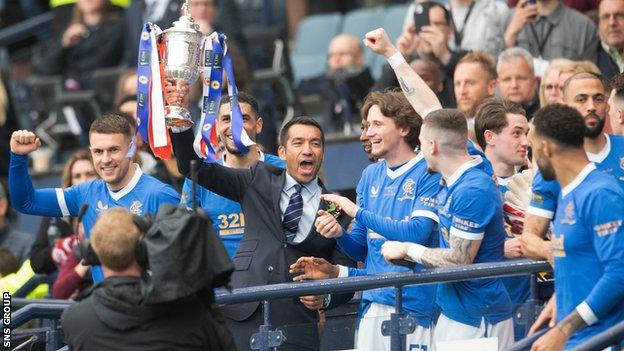[ad_1]

A year ago, Giovanni van Bronckhorst was appointed Rangers manager.
Before taking his place in the dugout, the Dutchman had to watch his new side being dismantled by Hibernian in a League Cup semi-final.
At that stage Rangers were top of the Premiership by four points, but had failed to recapture their scintillating form of the previous unbeaten campaign, when Steven Gerrard led his side to a first title for a decade.
Gerrard had grown frustrated by a lack of investment – made worse when Rangers went out of the Champions League qualifiers to Malmo – and he was soon on his way to Aston Villa as their Europa League group campaign faltered.
That was the context as Van Bronckhorst held up the red, white, and blue scarf in the Ibrox blue room. The question is, are the club any better off now than they were then?
Domestic questions
Here, the answer is pretty clear: No.
Van Bronckhorst took charge with a four-point lead over Ange Postecoglou’s callow Celtic, and that gap grew to six as the Dutchman won his first seven league games in charge.
But Celtic went on to win the title by four points, as two derby defeats and some costly draws meant Rangers’ grip on the trophy slipped.
Now, having been beaten 4-0 by Celtic and dropped points in three of their last five league games before the break, Rangers trail their rivals by nine points with more than half the season still to play.
Results are the bottom line of course, but they have been compounded by a lack of clear identity under Van Bronckhorst. Too often recently, Rangers’ attacking plan has not been clear.
In the 1-1 draw at home to Livingston, they sent 73 crosses into the box, most of which were dealt with comfortably.
Even under Gerrard – title-winning season aside – they were sometimes accused of resorting to aimless crosses when opponents made life difficult for them. Even so, there has been a less discernible way of playing under Van Bronckhorst, which has led to doubts emerging among the supporters.
The manager’s selection has been confusing for some, and his apparent lack of urgency in the dugout during difficult spells in games has also been a point of criticism.
We will never know if Rangers would have retained their title had Gerrard stayed, but what is clear is they have been no better domestically than they were a year ago.
A Scottish Cup win at the end of last season, though important because of a lack of trophies in the last decade, is not enough to avoid that conclusion.
Progress in Europe reaps rewards
It is in European football where the biggest strides have been made at Rangers.
Under Gerrard they made progress year-on-year in the Europa League, but when Van Bronckhorst took the reigns they were struggling in their group.
Not only did the former Champions League winner (as a player) steer them through the section, but he got them all the way to the final in spectacular fashion.
Borussia Dortmund, Red Star Belgrade, Braga, and RB Leipzig were all dispatched over two legs, and in style too. While Gerrard had guided Rangers into the knockout stages before, this was different.
Rangers were free-scoring, netting 16 times in eight matches against good opposition. Van Bronckhorst was able to come up with specific tactical plans, and harnessed a belief and vibrancy at Ibrox.
They were a couple of misses against Eintracht Frankfurt away from lifting the trophy.
The Dutchman then masterminded a victory against PSV Eindhoven in the Champions League play-off to return the club to Europe’s elite competition this term.

The group stage proved to be the worst seen in the history of the competition, and it has arguably derailed Rangers’ whole season given the bruising nature of the losses and the injuries picked up in those games.
But there has undoubtedly been progress on the European stage in the last 12 months, even if the last eight weeks don’t make it feel like that.
The continental results, and the knock-on effect that has on the saleable value of players such as Calvin Bassey, Nathan Patterson, and Joe Aribo, have allowed the club to reach a sustainable financial position, too.
Van Bronckhorst can take a lot of credit for that.
Stick or twist?
Ultimately, Van Bronckhorst has to take responsibility for the poor domestic results and embarrassing Champions League campaign.
But there is a collective responsibility at the club for what ultimately happens on the pitch, so there is blame to go around.
The unconvincing January recruitment of Aaron Ramsey and Amad Diallo on loan while Celtic strengthened and won the title was followed by a summer window which has left many Rangers fans cold.
Left-back Ridvan Yilmaz has barely played, Rabbi Matondo has been poor in his limited minutes, while Ben Davies has had intermittent injury problems and John Souttar and Tom Lawrence have been out for months.
Antonio Colak, the league’s top goalscorer, is the only major success so far.
Sporting director Ross Wilson has come in for criticism for that record, and while the club managed to sell assets like Patterson, Aribo, and Bassey for big money, it’s now difficult to see where the next healthy sale is coming from.
That situation, and the fact director loans have to be repaid, will hinder whoever the Rangers manager is in the short term. Van Bronckhorst has had to deal with that, although he will likely have had a say in transfers too.
He can also point to key players such as Connor Goldson and Ryan Jack suffering injuries which has hardly helped.
However it is always going to be the manager who pays the price for underperformance – even if they might argue the hand they have been dealt is not the best.
“This is a different team that went to the Europa League final last season,” former Rangers striker Kenny Miller told the BBC’s Scottish Football podcast.
“Not just with missing guys like Aribo and Bassey. But even with regards to their mindset. When they turned up to a European game last season they were going to beat whoever was in front of them.
“But that belief, confidence and togetherness that took Rangers there doesn’t seem to be there.
“If they believe Giovanni is the right man for the job, they have to back him. If they don’t, now’s the time to make a change. It’s effectively a pre-season and the chance for a new manager to come in.”






